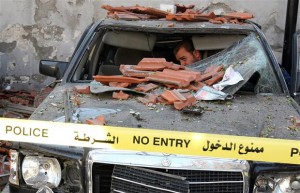 TWO simultaneous car bombs at security buildings rocked Damascus on the morning of Friday December 23rd. Residents and diplomats said the explosions, which were followed by gunfire, in Kafer Souseh, a wealthy area of the capital, reverberated across the city. At least 44 people died and scores more were injured, according to Syrian officials who said that the majority were civilians. State television and SANA, the Syrian news agency, showed graphic footage of burned-out cars and rescuers carting off bodies. For now, that is all that is known.
TWO simultaneous car bombs at security buildings rocked Damascus on the morning of Friday December 23rd. Residents and diplomats said the explosions, which were followed by gunfire, in Kafer Souseh, a wealthy area of the capital, reverberated across the city. At least 44 people died and scores more were injured, according to Syrian officials who said that the majority were civilians. State television and SANA, the Syrian news agency, showed graphic footage of burned-out cars and rescuers carting off bodies. For now, that is all that is known.
Since protests began against the government of Bashar Assad nine months ago, Syrian officials have portrayed their opponents—who have mostly been peaceful protesters though some, mainly army defectors, have now taken up arms—as terrorists and extremists.
For this reason, opposition groups blame the regime for the explosions. The Syrian Revolution General Commission denounced the bombings as “a familiar pathetic move from the Syrian government to plant fear and terror in the hearts of civilians”. They suspect the government of trying to convince observers from the Arab League, who arrived the day before to assess the situation in Syria, that terrorists are behind the unrest.
State media was unusually quick to cover the bombings, saying they bore the “blueprints of al-Qaeda”. By contrast, an attack on a security building in Harasta in November received no coverage. The league delegation was quickly ushered to the scene of the attacks, which were described as part of an Israeli-American plot. “We said it from the beginning, this is terrorism,” Faisal Mikdad, the deputy foreign minister, told reporters. “They are killing the army and civilians.”
Armed opponents, most of whom are part of the Free Syrian Army, the main opposition group, have claimed two attacks in the capital in recent months. But equipped with little more than guns and rocket-propelled grenades, such coordinated attacks are beyond them. Government forces have enough control over the country and its borders to make an attack by foreigners—such as al-Qaeda—unlikely. Bombings and extremists have been rare in the authoritarian country: the last regular bombings occurred in the 1980s when Bashar’s father Hafez grappled with an Islamist uprising. Since then the regime has worked hard to quash any signs of religious fundamentalism.
The arrival of the Arab League delegation in Damascus on Thursday to oversee an end to the violence came at the end of one of the bloodiest weeks since the start of the uprising and after weeks of delaying tactics by Mr Assad. One hundred and seventy people, including army defectors, were killed in violence in the Jabal Zawiya area close to the Turkish border in the north-west, according to opposition groups. Dozens of Syrian military personnel were also killed.
Before Friday’s bombings, dissidents had already claimed the government would seek to put on a show for the Arab League. The opposition has criticised the appointment as head of the mission of Mohammed Ahmed al-Dabi, a Sudanese general who was in charge in Darfur during a period during which war crimes are alleged to have taken place.
The attacks may not have any impact on the view of the Arab League, which has long been suspicious of the Syrian regime’s claims that the country is grappling with terrorists and frustrated by Mr Assad’s reluctance to sign any kind of deal. But the bombs may further rally the president’s supporters to his side. While opponents denounced the authorities’ responsibility for the bombs, the government’s supporters pointed to them as further evidence of a conspiracy against their country.

Leave a Reply
You must be logged in to post a comment.